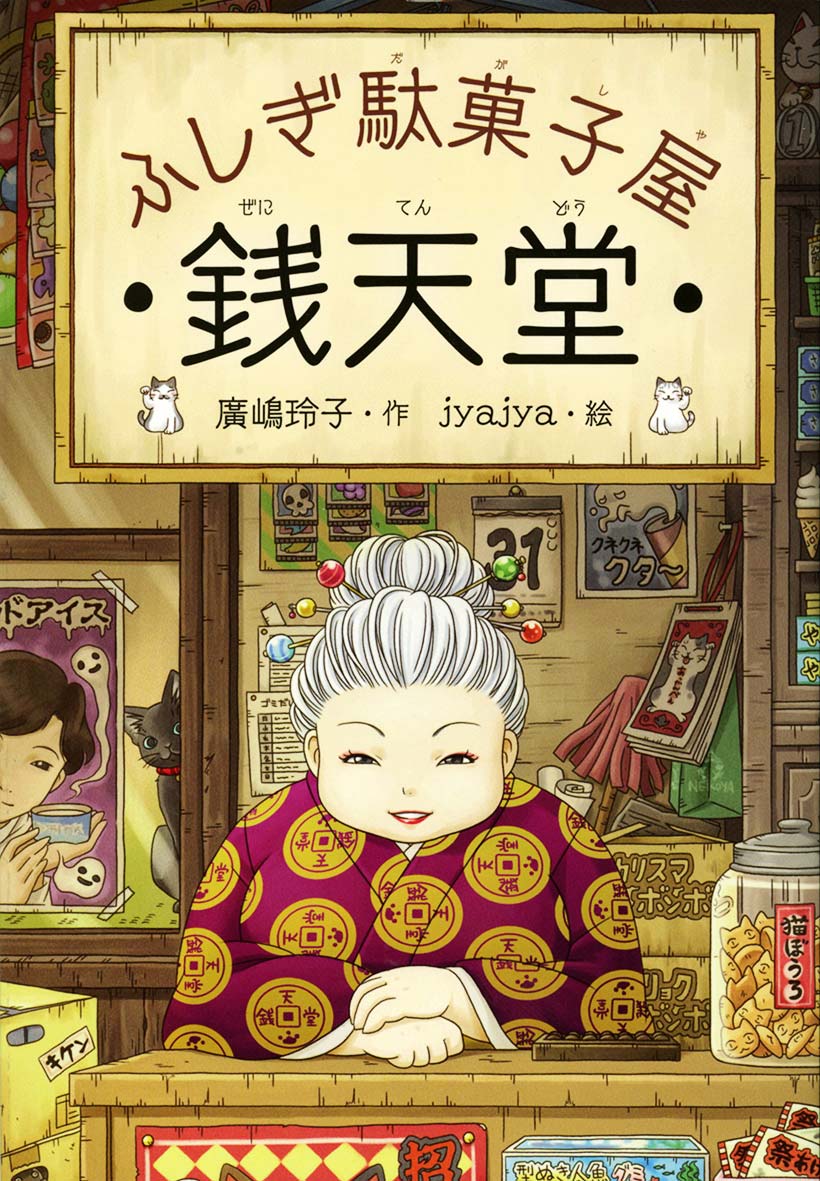
ふしぎ駄菓子屋 銭天堂 series is a collection of short stories about a strange candy shop named Zenitendō. This is not a regular shop as it can only be found by "lucky" customers (so don't waste your time trying to find it, they are nowhere to be found on Google Maps, or any maps, really). All the items they sell have some sort of magical power, and somehow customers manage to find the one for them that can fix a particular problem or a concern they have.
ふしぎ = mysterious
駄菓子屋 = candy shop
…Sounds like a sweet kids' book cliché ending? Not so fast. It's not always a happy ending fairy tale. Each candy comes with instructions, and customers are expected to read them very carefully. If they fail to do so…? There is often a twist to the story, and it's sometimes dark humor or bittersweet. Each chapter features a different customer, but not all of them are children. Sometimes an adult customer wanders into the Zenitendō and has a mysterious experience. Those chapters tend to be easier to relate to for readers who aren't children. Since it was first published in 2013, this novel series has been gaining popularity among Japanese children (and often their parents). There has been fourteen books in this series, and it was adapted into an animated movie as well as an anime series in 2020 as well.
For Japanese Learners
This series is best suited for upper beginners who already have some reading experience. Absolute beginners might find it a little too challenging. There's no furigana for very basic kanji — kanji at elementary school first and second-grade levels. Other kanji have furigana on their first appearance on each page, and this could be a good reading practice as well as vocabulary building! There are occasional illustrations to give you the gist, but not enough for you to rely on to keep up with what's going on. It's a fairly recent series, some of the word choices such as 超 or めちゃくちゃ (both meaning "super") are not so traditional and more modern compared to long-selling classics like Kiki's Delivery.
The storytelling is written in the plain form (that is, not です/ます style), often from the perspective of the main character of each chapter. One thing that might throw you off is that the owner of Zenitendō, Beniko, has a unique speech style. It's especially apparent when she says ござんす at the end of her sentences. Her speech style is very fictional character-y and old-fashioned, like how some people talked back in the Edo era.
Sounds like a material you'd want to work on? Click here to read a sample chapter!
Comments From Fellow Japanese Learners
I had a lot of fun reading this book. It was challenging and definitely above my grammar level, but I managed to understand almost everything (with a little help from the WaniKani reading group). The stories are for kids, but they are not too simplistic. A few of the main characters are adults. There is a lot of repeated vocab throughout the book, so it was cool to see how much easier it got towards the end. Most kanji have furigana first, but they stop using it after the first appearance on each page, so I got really good at recognizing new vocabulary in context.
lasyat
I enjoyed the book so much that I actually proceeded to read the following six sequels within a few months! Although I was at level 44 on WaniKani when I first read Zenitendō, it was still my very first adventure into reading native content. I recommend this book because each chapter is self-contained, and the story generally follows the antics of children. These two aspects combined make it very easy to digest. The young characters seldom use hard-to-understand vocabulary, and since each chapter is its own story, you never have to recall events that happened more than roughly twenty pages ago at most. This also allows you to jump around within the book itself. Don't like a chapter? Skip it! Finding it a bit too difficult for you to be able to enjoy? Skip it and come back later! It's a series of thirteen books at present, so if you enjoy the first one, you've got a dozen more to enjoy. (And, they only get better and better after the first book, trust me!)
Houndstooth
Useful Links
- ふしぎ駄菓子屋 銭天堂 WaniKani Book Club
Check it out for useful resources and information such as shared vocabulary list, discussions, emotional support and more! - Sample Chapter
A sample capter is available for you to take a peek! - Online Special Episode
In addition to the sample chapter, this is another story that is available for free. - Amazon.co.jp
Check out the WaniKani Book Club for more information about where/how to buy a copy from outside Japan!